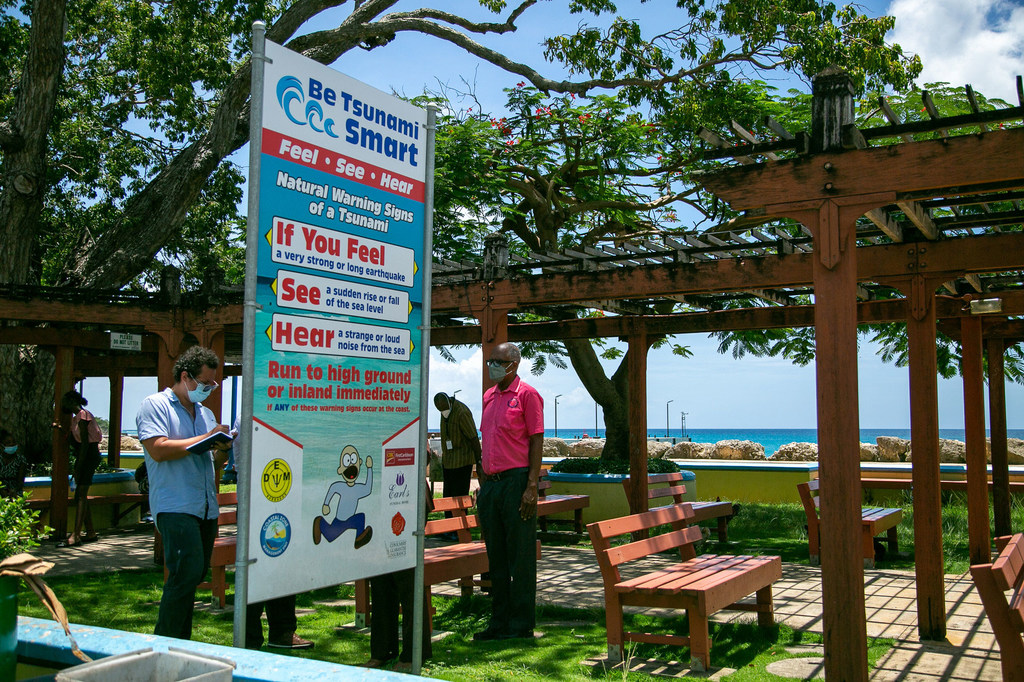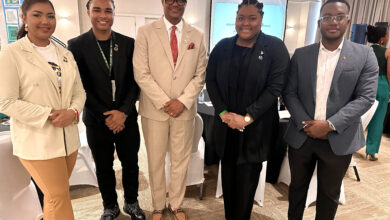(Caribbean Meteorological Organization Press Release) Dr. Arlene Laing, Coordinating Director of the Caribbean Meteorological Organization Headquarters and the Permanent Representative of the British Caribbean Territories with the World Meteorological Organization (WMO) made a statement at the 19th World Meteorological Congress, during the WMO Leadership and Management Forum on the Implementation of the UN
Early Warnings for All, a climate adaptation measure.
Dr. Laing highlighted the challenges faced by Caribbean Small Island Developing States (SIDS), in particular as it relates to hurricanes and their impacts. She informed of the cooperation among CMO Members whereby neighbouring islands provide forecasts and warnings for Member States that do not have those capabilities. She noted the importance of good working relationships between National Meteorological and Hydrological Services and National Disaster Risk Management Organizations, which are the authorised providers of early warnings; especially regarding the communication aspects of early warning systems.
She was pleased that three CMO Members (Antigua and Barbuda, Barbados, and Guyana) are among the 30 chosen priority countries for Early Warning for All, while noting that the Initiative is needed by the entire Caribbean, which is prone to multiple hazards that can occur concurrently, in a cascading manner, or in quick succession. For example, in 2021, Haiti experienced a tropical storm, followed by an earthquake and, quickly followed by another tropical storm; within a few days of each other. Dr. Laing welcomed the Early Warnings for All initiative and its benefits for
the Caribbean.
At the 19th World Meteorological Congress, Dr. Laing also intervened in support of WMO’s efforts to protect radio frequencies that are important for earth observations, weather forecasting, and climate services. She cited, in particular, the impact on sea-surface temperature measurements of a new spectrum allocation for the future development of International Mobile Telecommunications (IMT). Studies show that IMT identification will interfere with sea surface temperature measurements up to 2000 km from the coast, thereby degrading the data. Sea surface temperature measurements are important for predicting where tropical storms and hurricanes are likely to form, that is, where the sea-surface temperature reaches or exceeds 26ºC.
Additionally, rapid intensification of storms has been observed when they move over warm currents and eddies. She noted that, for severe weather
systems over the Atlantic Ocean and the Caribbean Sea, the primary air and sea measurements are from satellites. This is why the CMO, in particular, is seeking the protection of the radio frequencies used for earth observations and those used for the provision of satellite links to relay data from science
and earth observation missions.
As the Permanent Representative of the British Caribbean Territories with WMO, Dr. Laing also worked with other CMO Members (Barbados, Guyana, Jamaica, and Trinidad and Tobago) at the 19th WMO Congress to intervene on behalf of maintaining and expanding capacity-building for the benefit of
National Meteorological and Hydrological Services in the Caribbean.
About the CMO
The Caribbean Meteorological Organization (CMO) is a specialized agency of the Caribbean Community that coordinates the joint scientific and technical activities in weather, climate and water – related sciences in sixteen English-speaking Caribbean countries (Anguilla, Antigua and Barbuda, Barbados, Belize, British Virgin Islands, Cayman Islands, Dominica, Grenada, Guyana, Jamaica, Montserrat, St. Kitts and Nevis, Saint Lucia, St. Vincent and the Grenadines, Trinidad and Tobago, Turks and Caicos Islands). The Organs of the CMO are: (i) The Caribbean Meteorological Council (CMC)‐Governing Body of the CMO, (ii) The Headquarters Unit (Secretariat), headed by a Coordinating Director, located in Trinidad and Tobago; (iii) The Caribbean Institute for Meteorology and Hydrology (CIMH) located in Barbados; and (iv) The Caribbean Meteorological Foundation (CMF).
The CMO originated from the British Caribbean Meteorological Service, founded in 1951.






